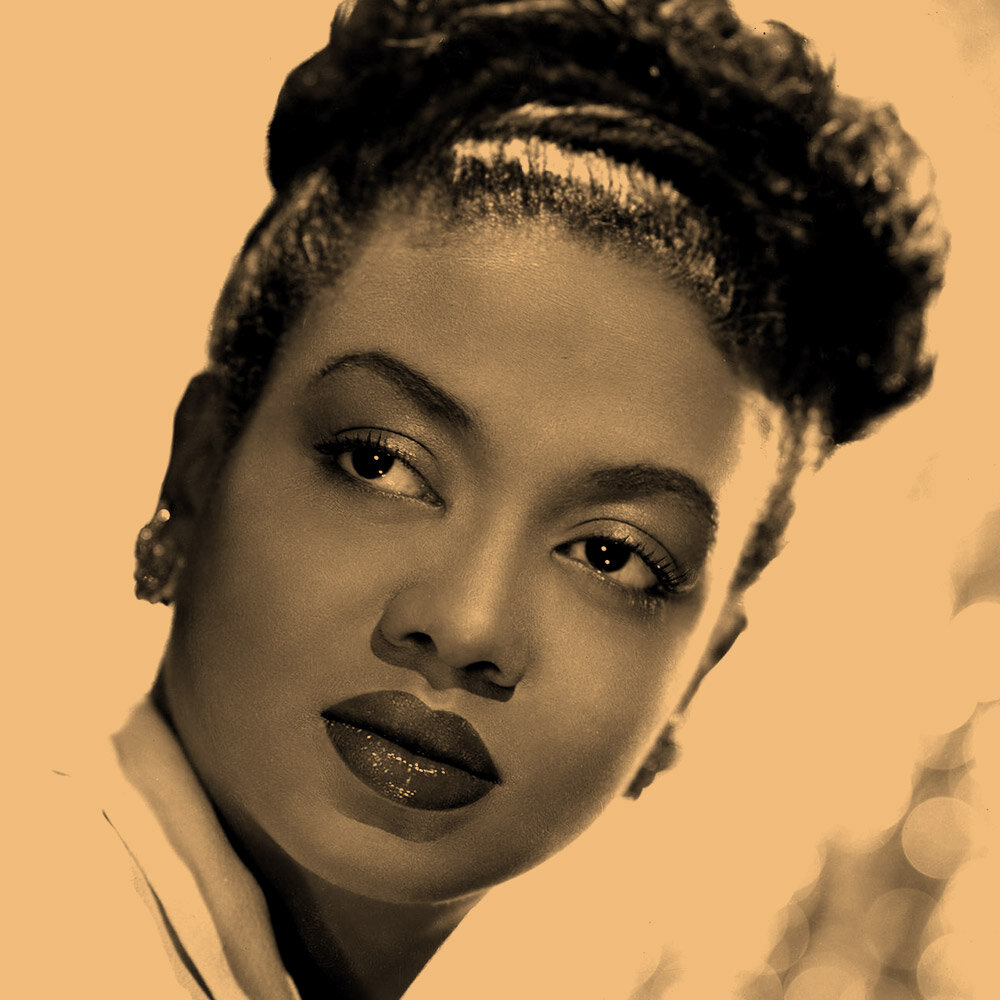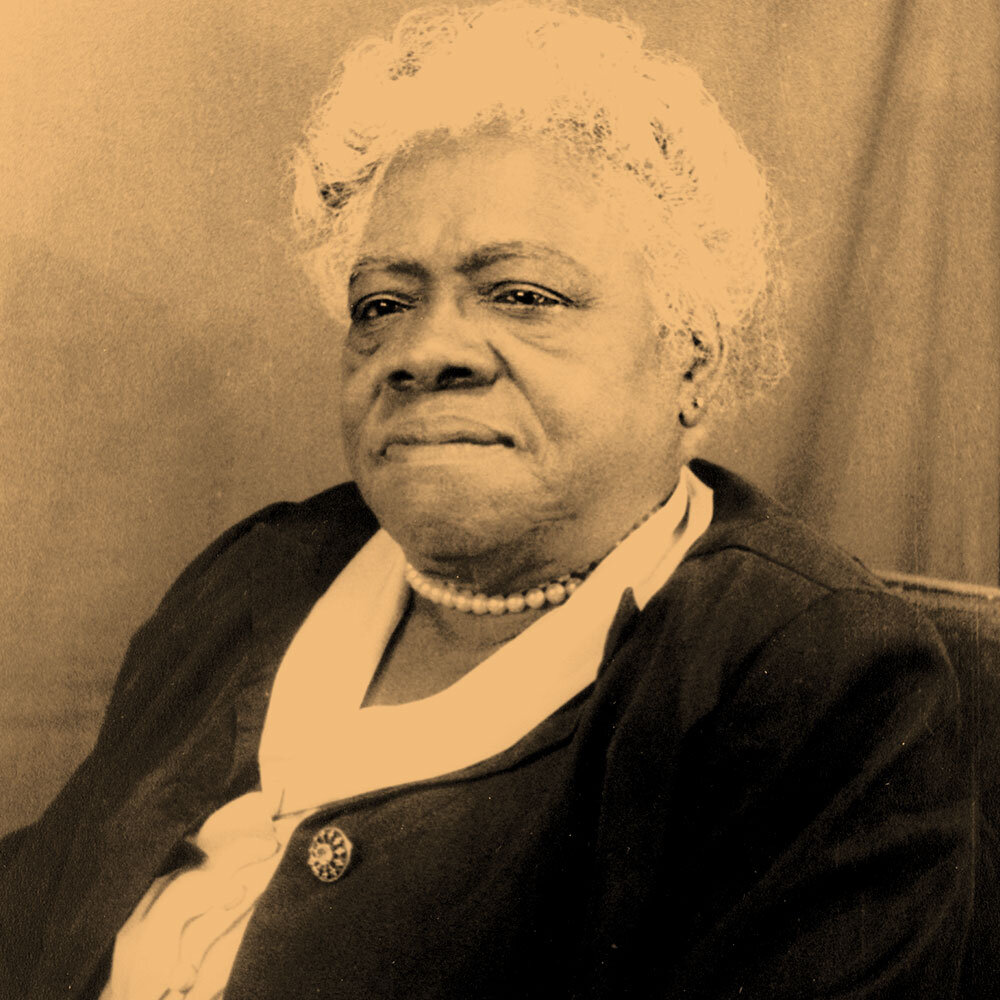OUR PIONEERS
Joan Hill
Muskogee/Cherokee Painter
Joan Hill (December 19, 1930 – June 16, 2020), also known as Che-se-quah, was a Muskogee Creek artist of Cherokee ancestry. She was one of the most awarded Native American women artists in the 20th century. She received more than 290 awards from countries around the world. Other honors include over 20 Grand Awards, and the Waite Phillips Artist Trophy. In addition, Hill was the winner of a prestigious mural competition at the Daybreak Star Performing Arts Center from the Seattle Arts Commission in Washington. In 1974 Hill was given the title "Master Artist" by the Five Civilized Tribes Museum in Muskogee.
Ruby Bridges
American Civil Rights Activist
Ruby Nell Bridges, 6, was the first African American child to attend William Franz Elementary School in New Orleans after federal courts ordered the desegregation of public schools. Bridges and her mother were escorted to school by four federal marshals during the first day that Bridges attended William Frantz Elementary. In the following days of that year, federal marshals continued to escort Bridges, though her mom stayed behind to take care of her younger siblings.
Hazel Scott
Jazz pianist
She told the committee’s members, “Mudslinging and unverified charges are just the wrong ways to handle this problem.” With the same poise she brought to the stage as a musician, she testified that “what happens to me happens to others and it is part of a pattern which could spread and really damage our national morale and security.”
Hazel Dorothy Scott was a Trinidadian-born jazz and classical pianist, singer and actor. She was an active and acclaimed performing artist from the 1930s till her death, and also portrayed herself in several films.
Sadie Alexander
American solicitor
In 1921, Sadie Alexander became the first African-American to earn a Ph.D. in economics. A few years later, she went to law school and became a celebrated civil rights attorney. But she never abandoned her focus on economic issues. In speech after speech, she argued that full employment — when everyone who wants a job can get one — was absolutely necessary to achieve racial equality. Today on The Indicator, Episode 1 in our multipart series about overlooked economists from the past. For more information on Sadie, go here.
Alberta Schenck Adams
Civil rights activist
In the spring of 1944 Alberta was working in Nome’s Dream Theater as an usher. She was fired from her position for expressing her opposition to the theatre’s Jim Crow policies which forbade Natives and “half-breeds” from sitting in the white’s only section. In an essay published in the March 3, 1944 edition of the Nome Nugget, Alberta expressed eloquently the sentiment echoed later in the civil rights movement of the 1950’s “I only truthfully know that I am one of God’s children regardless of race, color or creed.” Alberta went on to expose the practice of Jim Crow as counter to the spirit of the Declaration of Independence and the Constitution of the United States of America.
Ruth Ellis
LGBT Activist
Before her death in 2000, Ruth Ellis was considered the world’s oldest surviving out lesbian. In 1937, living in Detroit with her partner Babe Franklin, Ellis became the first woman to own a printing business in the city. Her house eventually became a congregating spot for African-American gays and lesbians, and now The Ruth Ellis Center in Detroit is one of four U.S. agencies dedicated to homeless LGBT youth and teenagers. For more information on Ellis, go here.
Maria Jesus Alvarado Rivera
Peruvian journalist
Regarded as the “first modern champion of women’s rights in Peru,” María Jesús Alvarado Rivera was a journalist, teacher, and activist from Chincha Alta, Peru. Alvarado Rivera spent her lifetime dedicated to empowering women through the establishment and expansion of educational programs, access to work, and political representation. Her advocacy focused on progressive models of childhood and adult education, sexual health awareness, reintegration programs for sex workers, and land rights for the indigenous. Alvarado Rivera was an international figure and her lectures are considered the first examples of public feminist discourse in Peru. For more information om Maria Jesus Alvarado Rivera, go here.
Mary McLeod Bethune & the Black Cabinet
American educator, stateswoman, philanthropist, and civil rights activist.
Mary McLeod Bethune, who was the Director of Negro Affairs in the National Youth Administration, was the organizer of the Black Cabinet, a group of African-Americans who served as advisers to President Franklin D. Roosevelt during Roosevelt’s 1933 - 1945 term in office. These 45 individuals worked in federal executive departments and Roosevelt’s New Deal agencies. Ms. Bethune was a close friend of Eleanor Roosevelt’s and was one of the most important black educators, civil and women’s rights leaders and government officials of the twentieth century.
Mary Elizabeth Bowser
Union Spy
Mary Elizabeth Boswer was born in the time period of 1839, in Richmond, Virginia. Mary was born as a slave for the Van Lew family. Her slave owner, John Van Lew, was a wealthy hardware merchant. At the beginning of the Civil War on April 12, 1861, Elizabeth Van Lew asked Mary to be a spy to help the Union. Elizabeth couldn't take on the task by herself because she was supposed to be an important member of Richmond, but only because of her father's wealth and status. Elizabeth was a spy but also helped the Union by saving the prisoners and helping them escape.
Malala Yousafzai
Pakistani activist
On 9 October 2012, while on a bus in the Swat District in Pakistan, after taking an exam, Malala Yousafzai and two other girls were shot by a Taliban gunman in an assassination attempt in retaliation for her activism; the gunman fled the scene. Yousafzai was hit in the head with a bullet and remained unconscious and in critical condition but later improved and recovered. Yousafzai is now an activist for female education and is the youngest Nobel Prize laureate. Her advocacy has grown into an international movement, and according to former Pakistani Prime Minister Shahid Khaqan Abbasi, she has become "the most prominent citizen" of the country.
Isolina Ferré Aguayo
Roman Catholic religious sister & humanitarian
Sister Isolina Ferré, who was known as the “Mother Teresa of Puerto Rico,” was born in Ponce to a wealthy family. One of five siblings, José, Carlos, Hernán, Rosario, and Luis Antonio [Ferré] (the latter was a former governor of Puerto Rico), she traveled to the United States where she began her novitiate to become a missionary sister of the Order of the Holy Trinity [Siervas de la Orden Misioneras de la Santísima Trinidad]. As part of her religious work, Ferré traveled often between the island and the United States, serving as an abbess in Cabo Rojo, Puerto Rico, and New York City. She eventually established six community centers to aid the disadvantaged.
Ambassador Julia Chang Bloch
Chinese American businessperson and diplomat
Ambassador Julia Chang Bloch, the first Asian American to hold such rank in U.S. history, has had an extensive career in international affairs and government service, beginning in 1964 as a Peace Corps Volunteer in Sabah, Malaysia and culminating as U.S. Ambassador to the Kingdom of Nepal in 1989. Ambassador Bloch served in the U.S. Agency for International Development as Assistant Administrator for Food for Peace and Voluntary Assistance and as Assistant Administrator for Asia and the Near East, positions appointed by the president and confirmed by the Senate. She also was the Chief Minority Counsel to a Senate Select Committee; a Senate professional staff member; the Deputy Director of the Office of African Affairs at the U.S. Information Agency; a Fellow of the Institute of Politics at Harvard University's Kennedy School of Government, and an Associate of the U.S.
-Japan Relations Program of the Center for International Affairs at Harvard.
Ambassador Patricia Roberts Harris
American government official and diplomat
Patricia Roberts Harris was the first African American female Ambassador. She served as Ambassador to Luxembourg from 1965 to 1967. She served as the first African American woman to hold a Cabinet position when she served as the US Secretary for Housing and Urban Development (HUD), 1997 -1979, as well as the Secretary of Health, Education and Welfare (HEW), 1980 – 1982, both under President Jimmy Carter. As Secretary of HUD, she fought for fair housing and employment practices. Ambassador Harris was also the first African-American to head a law school, as Dean of Howard University’s School of Law. Ambassador Harris was born on May 31, 1924 in Mattoon, Illinois. She died of breast cancer in 1985, at age 60.
Mari-Luci Jaramillo
First Female Latina U.S. Ambassador
Mari-Luci Jaramillo, the daughter of a shoe-maker in the small town of Las Vegas, N.M., and professor at The University of New Mexico was the first Latina to become a U.S. Ambassador—accepting an assignment to the Republic of Honduras. To honor the legacy of Jaramillo, fellow UNM colleagues, alumni, and friends came together to establish the U.S. Ambassador Mari-Luci Jaramillo Endowed Scholarship. The scholarship will support doctoral students in the UNM College of Education (COE) whose backgrounds have prepared them to understand the unique needs of the Latino community.
Barbara Jordan
American lawyer, educator, politician and human-rights activist
Barbara Jordan emerged as an eloquent and powerful interpreter of the Watergate impeachment investigation at a time when many Americans despaired about the Constitution and the country. As one of the first African Americans elected from the Deep South since 1898 and the first black Congresswoman ever from that region, Jordan lent added weight to her message by her very presence on the House Judiciary Committee.
Kamaladevi Chattopadhyay
Indian social reformer and freedom activist
A freedom fighter, actor, social activist, art enthusiast, politician and feminist rolled into one, Kamaladevi Chattopadhyay’s left a massive mark in Indian culture and yet her contributions are little remembered and is virtually unknown outside India. Kamaladevi was a leader when it came to uplifting women. She did extensive work for women's rights and participated in the independence movement. Several cultural institutions in India today exist because of her vision, including the National School of Drama, Central Cottage Industries Emporium, and the Crafts Council of India.
Nina Simone
American singer, songwriter, and civil rights activist
Legendary performer Nina Simone sang a mix of jazz, blues and folk music in the 1950s and '60s, later enjoying a career resurgence in the '80s. A staunch Civil Rights activist, she was known for tunes like "Mississippi Goddam," "Young, Gifted and Black" and "Four Women." Born on February 21, 1933, in Tryon, North Carolina, Nina Simone studied classical piano at the Juilliard School in New York City, but left early when she ran out of money. Performing in night clubs, she turned her interest to jazz, blues and folk music and released her first album in 1957, scoring a Top 20 hit with the track "I Loves You Porgy." In the ‘60s, Simone expanded her repertory in exemplary fashion while becoming identified as a leading voice of the Civil Rights Movement.


















